Cast
Born Herbert Morse, 10 June, 1918, London. Died 2 February, 2008, aged 89.
Morse worked as an errand boy delivering samples for a glass manufacturing company before, in 1935, auditioning and being accepted for the Royal Academy of Dramatic Art (RADA). His debut was in the People Theatre's If I Were King, and in School For Slavery in the West End. He was producer, director and star of The Voice Of the Turtle on tour. His film debut was in Will Hay's The Goose Steps Out (1942) with another newcomer, Peter Ustinov. He earned a reputation as a character actor in films like There's A Future In It (43), Late At Night (46) and Daughter Of Darkness (48). He also did some early television work, such as guest starring in the series' The Unforeseen (60) and Sir Francis Drake (61). He starred in the original radio 1947 play by Agatha Christie Three Blind Mice, which she later adapted into the 1952 play The Mousetrap.
He married the Canadian actress Sydney Sturgess in 1939 and had two children, Haywood (born 1947) and Melanie (born 1945). In 1951 the family moved to Toronto. He worked as a producer, director and actor in Canadian and U.S. television and film, appearing in episodes of The Naked City (60), Alfred Hitchcock Hour (63), Wagon Train (62), The Twilight Zone (episode A Piano In The House, 1963) and The Outer Limits (episode Controlled Experiment, 1963). He acquired fame with his role as Lt Gerard in The Fugitive (1963-1968).
Morse returned to Britain to visit both his children, then attending RADA. While there Roger Moore asked him to appear in The Saint (UK, 1966) which led to other roles in Lew Grade series (and eventually to Space 1999). In the late 1960s and early 1970s Morse pursued his acting and producing career on both sides of the Atlantic. In addition, he spent one semester in 1968 as Adjunct Professor in the Drama Department of Yale University. Guest roles included The Invaders (US, episode The Life Seekers, 1968), and in Canada The Starlost (1973). He was a regular in two ITC series for Lew Grade, The Adventurer (UK, 1972), some episodes of which he directed, and the short lived The Zoo Gang (UK, 1973).
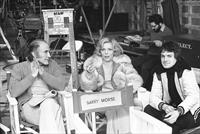
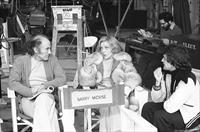
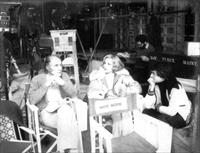
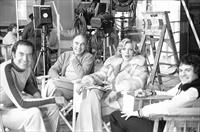
During filming of the series, Barry's 27 year old son Haywood Morse visited. Haywood remembered the visit during the 2022 convention, saying his father probably hoped they would give Haywood a role, but they didn't. They are seated behind the Main Mission computers (the backs of the panels can be seen on the raised platform).
For the second series of Space 1999 Morse was offered less money than the first series. Morse attempted to negotiate a higher offer through his agent, but Gerry Anderson was unwilling to offer more. Ultimately no agreement was reached, and Morse did not return. (See Destination Moonbase Alpha by Robert E Wood (2010) page 274.
Morse reprised the role of Victor Bergman in The Return of Victor Bergman, filmed in 2002 and first shown at the Journey To Where convention, 2010.
After Space 1999 he appeared in a number of films such as Power Play (1975), Welcome To Blood City (1977), The Shape Of Things To Come (1979), and The Changeling (1980), the TV movies A Tale Of Two Cities (1980) and The Return Of Sherlock Holmes (1986), and the TV miniseries The Martian Chronicles (1979), The Winds Of War (1983), Sadat (1983), Master Of The Game (1984) and Reunion At Farnborough (1985). He was a regular in the comedy series Whoops Apocalypse (UK, 81), and was a guest on a Canadian show on psychic powers Beyond Reason in 1985. He also directed a TV adaptation of Isaac Asimov's The Ugly Little Boy (1981).
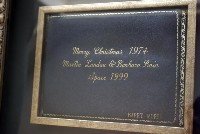
Address book given to Barry Morse in 1974 by Martin Landau and Barbara Bain.
Images thanks to Bob Wood.
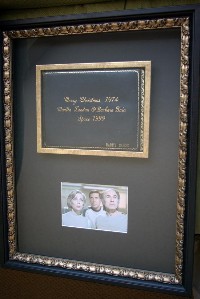
"It seemed very intriguing and we all knew that there was the possibility of making a very thrilling series out of space exploration and science fiction. But there was only one script. The truth is, on day one when we all went to Pinewood Studios to start shooting, neither Martin, nor Barbara, nor I or indeed anybody else had seen a script. To an old circus horse like me it was a bit ominous. I though 'Uh-oh..' The series was always a constant race against time. The result of that, in my view, was that not enough attention was paid to those small details of character and relationship which are the most important thing in a dramatic series.
I came up with the idea that Victor Bergman had come to England as a refugee child during the reign of the Nazis, and that he might have originally been Austrian or Czechoslovakian. I built up a whole character based on that, and the idea that, being somewhat older than almost all the other people on the space station, Professor Bergman could almost be described as a kind of space uncle.
I thought the quality of the writing and overall production in general really left a lot to be desired. An episode I thought was unusually effective was The Black Sun. We pretty much improvised a good deal of that episode. I recall one particular scene where Martin Landau and I were sitting on the steps. That scene had a certain amount of human value- no explosions, just two human beings.
After a year and a half, the quality of our scripts I didn't feel had made the improvements that they could have. Gerry came to me and asked me about the future and told me that they were going to go on with a new producer whose name is Fred Freiberger. Well, I had known Freddie in Hollywood in past times and he's an admirable fellow, I'm sure. He's kind to animals and writes regularly to his mother, but I didn't feel that, and he knows it, he was likely to improve the quality of the scripts either. So when Gerry asked if I wanted to go on and do however many shows there would be, and since the option was on my side, I simply said, Gerry, it's been lovely and I wish you all kinds of luck, but if it's all the same to you I'd just as soon like to go and play with the grown-ups for a while. I didn't mean to be unkind, but I just felt that a year and a half was enough. I've not seen any of the shows after that, so I don't know whether they were better or not, and it doesn't matter now. I enjoyed the time I spent with it, but I've always been a little disappointed that we didn't do it better for your sake."
Ray Austin on Barry Morse: Barry was a bit of a problem sometimes with directors, never with me, but he wanted to do his own thing.
(Andersonic #13, Feb 2012, p9)
Martin Landau on Barry Morse: Barry is a wonderful man. Kind, gentle, intelligent. He was born in the East End of London, which means he spoke like a Cockney when he was growing up. He worked like hell to get rid of that heavy dialect. He has since become a Canadian citizen. The English think he's English, Canadians think he's Canadian and, yes, Americans who know him from The Fugitive think he's one of us. Amazing, considering his handicap in having a thick, guttural Cockney accent as a kid. Barry's brother, a London law enforcement officer, visited the set one day. I chatted with him and could barely understand him, as his accent was so thick. It allowed me to understand what Barry had overcome. Mind you, he can still do a great Cockney character should he have reason to. Barry Morse is one of the sweetest, gentlest souls in the world ... and one hell of an actor!
(Science Fiction Television Series by Mark Phillips and Frank Garcia (McFarland, 1996)
Fred Freiberger on Barry Morse: Barry Morse's agent came in demanding a big raise. Gerry made him a counter-offer. Morse's agent made a bad tactical error which was sheer insanity for an agent. He said, "No, If it's not going to be that amount, we're finished. We're out." So immediately Gerry said, "Okay, you're out." What an agent should say is, "He's out...except...I'll have to check with him." We had big discussions about how to explain the disappearance of Professor Bergman, that he had a disease or something, and they asked us to take it out. Barry Morse is an excellent actor, but I felt his part was all wrong.
(in fact Gerry Anderson had offered Morse less money than Year 1, which Morse refused to accept)
Fred Freiberger on Barry Morse: 1 said, 'If you're going to have a professor, then have a young kid with a beard in there, as the professor. [Anderson and Lord Grade] were very nervous about this change, and they brought in a good- looking kid, Tony Anholt, to bring in some romantic situations. Gerry was really reluctant to fire anybody. We called Martin and Barbara in California, and they were anxious to return. But, of course, everybody wanted raises. We said, 'Look, we can't raise anybody - we're lucky if we can get this show on!' We really wanted a young person in place of the professor, but Gerry felt terrible about letting anyone go.
Morse was a guest at the 1982, 1986, 1989, 1992, 1999, 2000, 2001 and 2005 conventions in the U.S.A. He also attended the 1982 and 2005 Fanderson conventions in the UK, in 1990 in France and in 2000 in Italy.
He was interviewed on film in The Space: 1999 Documentary (1996). His autobiography, Pulling Faces, Making Noises, was published in 2004, with a new version Remember with Advantages in 2007 (the foreword that appears in both editions was written by Martin Landau). He wrote the foreword to the Powys Space: 1999 novel Survival (2005)
Copyright Martin Willey